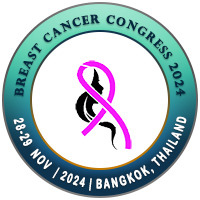
Navin Nayan
Tirunelveli Medical College, IndiaTitle: Hepatitis B And/ Or C Virus Reactivation in Breast Cancer Patients Receiving Chemotherapy: Treatment Challenges
Abstract
Viral hepatitis reactivation is one of the major challenges encountered during a variety of chemotherapy treatments. Liver dysfunction caused by HBV or HCV reactivation is a significant problem. In most cases, reactivations occur in patients who are carriers of HBV infection showing positive HBsAg. Reactivation also may occur in patients with resolved infection who are HBsAg negative, anti–HBs positive, and anti–hepatitis B core positive. We observed the HBV and/or HCV reactivation risks in breast cancer patients receiving commonly used chemotherapy regimens. A total of 43 breast cancer patients were identified with hepatitis viral reactivation during the study period of one year. Reactivation occurred both during adjuvant chemotherapy and hormonal therapy. Chemotherapy agents associated with reactivation in this study were Paclitaxel, Trastuzumab, Capecitabine, Cyclophosphamide, Platinum analogs and hormonal agents. Reactivation causes treatment break of average 2 months (Range 1 – 3 months).
Conclusion: Cytotoxic chemotherapy were associated with hepatitis viral reactivation in a significant no of patients. And patients with prior exposure to multiple lines of chemotherapy were at increased risk of reactivation. Regular monitoring for hepatitis viral reactivation and use of antiviral drug may reduce the treatment break interval.
Biography
Dr. Navin Nayan has completed MD in Radiation Oncology in 2017 and worked as Assistant Professor at State Cancer Institute, GMC and NEIGRIHMS, India. He has published several papers in index journals and has been serving as a reviewer for several reputed journals. Currently, he is pursuing medical oncology training.

